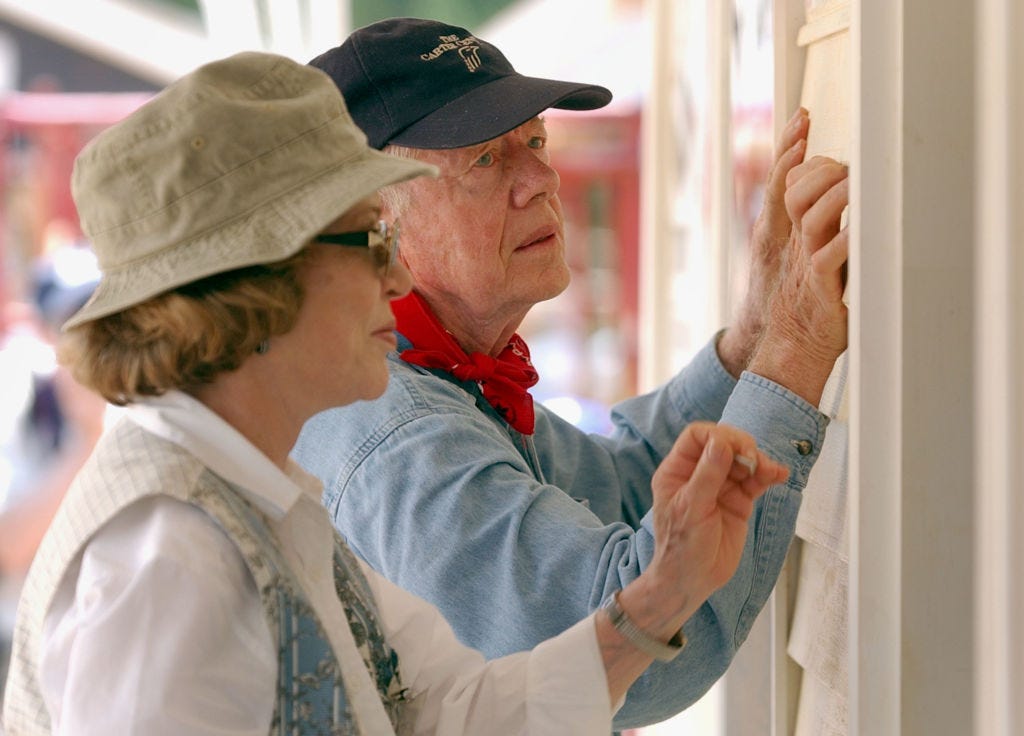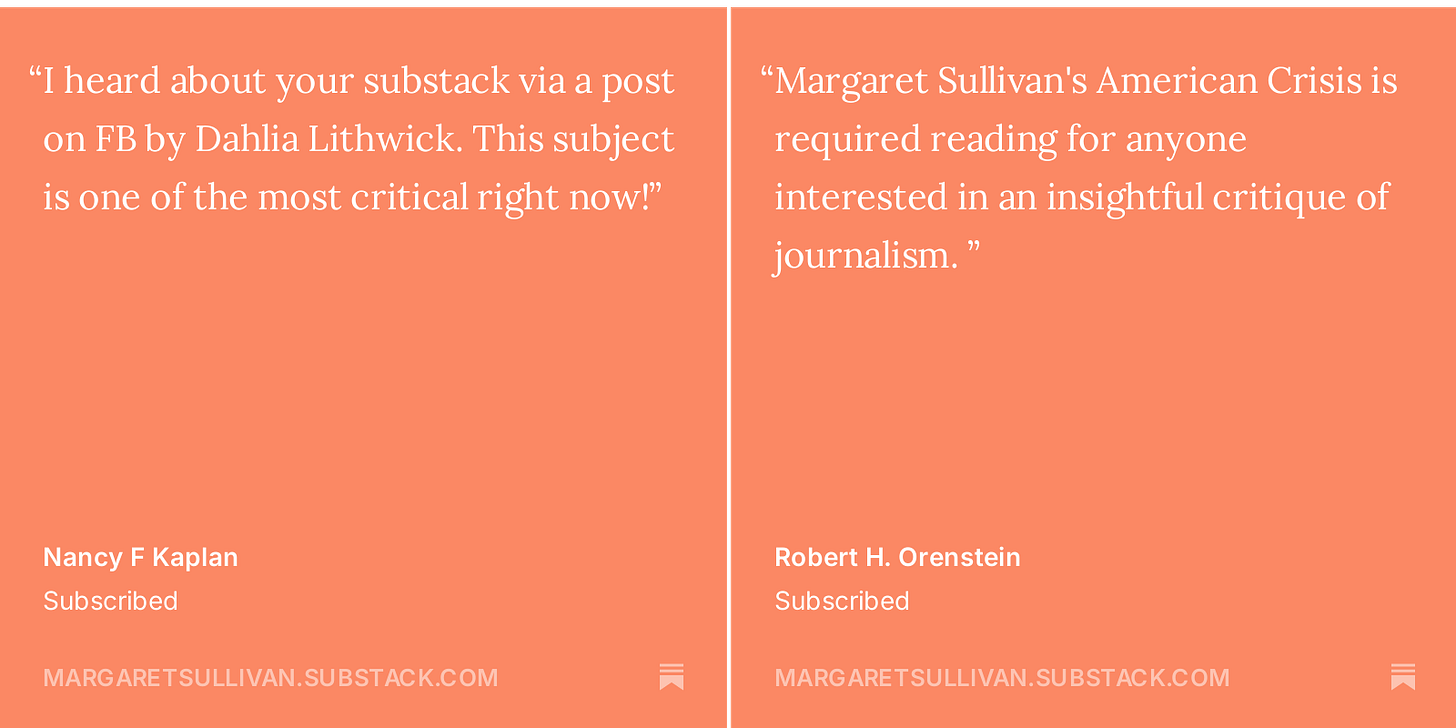Jimmy Carter, the year ahead, and my very own 'Project 2025'
Please join me in approaching the future with wary optimism and hopeful determination
My former colleague E.J. Dionne, a terrific columnist at the Washington Post, calls himself a “hope-monger.” I love that term and identify with it (and I greatly admire E.J.’s morally centered work which always shows his wealth of experience). Here’s a gift link to his recent column titled “Trump and Musk can’t take away my hope in government.”
As the calendar turns tonight to 2025, we need all the hope we can get.
Dionne posted recently about Jimmy Carter, who died over the weekend, and who can be held up as an exemplary public figure — quite a contrast to the president-elect. Carter (unlike Trump) did not win a second term, but he did succeed in many other ways. E.J. called him “prophetic on energy and human rights.”

If you want to judge Carter in strictly worldly terms, he won a Nobel Peace Prize; there may be no higher honor, and he earned it. If you want to judge him as a human being and a family man, there’s all sorts of evidence there, too, of his integrity, intelligence and honesty. Here’s a fine piece by Sheryl Gay Stolberg in the New York Times (this is a gift link, also) about how Carter redefined what a post presidency could be.
Carter stayed alive long enough to vote for Kamala Harris, and the timing of his death means that US flags will still fly at half-staff for Trump’s inauguration. I have a feeling he might approve.
But with Trump — infamous for his dishonesty and lack of integrity — coming into office, Americans who care about preserving democracy are going to need more than fond memories or a half-staff flag. Recently, I asked you to join me in suggesting action steps for this new era; you came through with many ideas expressed in the comments to that last post. Civic involvement and support for local news were key, with a lot of praise for newer local news organizations in your own communities.
One reader, Ralph Rosenberg, urged setting a goal of multiple concrete steps. Among them: “attend local meetings, write letters, organize community discussions, support independent journalism, document local impacts of state policies, and build networks of informed citizens.” He added: “Each story shared, each voice raised, and each connection made becomes part of resistance and renewal. If necessary, read about our civil rights movement, with its long-term commitment to action in the face of ongoing historic social and legal barriers.”
My own Project 2025 includes these plans:
— point out the flaws and foibles of today’s media, whether mainstream or clearly partisan. There is plenty to worry about, especially with the way corporate media is already kowtowing to Trump. Stay tuned here for that media criticism. Does it reach the right ears and have a chance of influencing coverage? I know from conversations I’ve had with other journalists, including those inside large newsrooms, that sometimes it does. Given the demise of ombudsmen and public editors who represent the readers to media decision-makers, I’ll do what I can right here, and in my Guardian US columns.
— bring attention to the journalism that serves democracy. There’s still plenty of that being published whether on major news sites, in local outlets, or by individuals on platforms like Substack. When it’s good, I plan to shout it out.
— work with young journalists, particularly students. This past semester, I taught a course called Ethics Essentials to students at Columbia Journalism School. Nothing has given me more hope and optimism than encountering their blend of idealism, determination and thoughtfulness. They are entering a tough, chaotic industry, and they have a lot to offer. I fervently hope that most of them get a chance to ply their trade.
— read literature or journalism that inspires me to do my best. I happened to read an essay, “Andy,” this past week about the legendary writer E.B. White, written by his stepson Roger Angell in the collection “Let Me Finish.” Both men are gone, but their great writing lives on. I loved this line by Angell, and it rings true for me: “It’s my belief — and I can’t prove it — that there are still readers and writers who feel a debt to E.B. White because of the sparkle and directness they found in a few lines or passages that he wrote decades ago.” When I really need writing inspiration I reread what I consider White’s greatest essay, “A Slight Sound at Evening,” his 1954 tribute to Thoreau’s “Walden,” on the centenary of its publication.
One more word about Jimmy Carter. His biographer, Jonathan Alter, writes here on Substack with the Old Goats newsletter. He wrote this week about his many interviews with Carter and explained why he titled his book “His Very Best” —
because it reflects not just the title of Carter’s 1975 campaign autobiography (Why Not the Best?) but his intensity and his sense of obligation to God, humanity, and himself. In his daily, even hourly, prayers, he asked not just “What would Jesus do?” but “Have I done my best?” After cantankerous Admiral Hyman Rickover sternly asked the nervous young lieutenant in a job interview if he had done his best at Annapolis — and he confessed that he had not — Carter disciplined himself to make the maximum effort in every single thing he did for the rest of his life. When bestowing the Nobel Peace Prize on Carter in 2002, the chairman of the Nobel committee said. “Carter himself has taken [from Ecclesiastes 11:4] as his motto: ‘The worst thing that you can do is not to try.’ Few people, if any, have tried harder.”
Finally, a heartfelt note of thanks and welcome. There are many new subscribers to American Crisis, and I’m thrilled to have you aboard. I deeply appreciate your interest, your support and your comments. And I wish you a very happy new year. As my dad would say, keep the faith. To those who have included messages with their subscriptions, like the ones below, know that they they mean a great deal to me.
What are you reading — either for pleasure, knowledge or inspiration — that you would recommend? And have you seen the new Bob Dylan biopic, “A Complete Unknown”? I liked it a lot, much more than I expected to.







Thank you, Margaret, for your own Project 2025, and for those gift links. I have a paragraph that I come back to whenever the future feels bleak, it’s by T H White, from “The Once and Future King.”
“The best thing for being sad,” replied Merlin, beginning to puff and blow, “is to learn something. That’s the only thing that never fails. You may grow old and trembling in your anatomies, you may lie awake at night listening to the disorder of your veins, you may miss your only love, you may see the world about you devastated by evil lunatics, or know your honor trampled in the sewers of baser minds. There is only one thing for it then—to learn.”
I hope we will all “learn something,” and pass along what we’ve learned, so that there are fewer and fewer of the “poorly educated” among us.
Thank you for being a source of both intensive media criticism and hopeful encouragement. Americans will continue to need both as we make our way through Trump's second term.
I especially appreciate these reflections on President Carter's life. I will hold his example close to my heart in the deeply troubling times ahead. Americans are going to need plenty of reminders that humans have the capacity to demonstrate moral strength in the face of depravity.
If anything could restore my Christian faith and motivate me to attend church (and that's a tall order), it's remembering how Carter's faith drove his actions.
Ms. Sullivan, please also keep reminding us of concrete actions we can take to resist and disrupt the destructive acts of Trump/MAGA/right-wing agents. I'll need to refill my bucket of hope and determination every day.